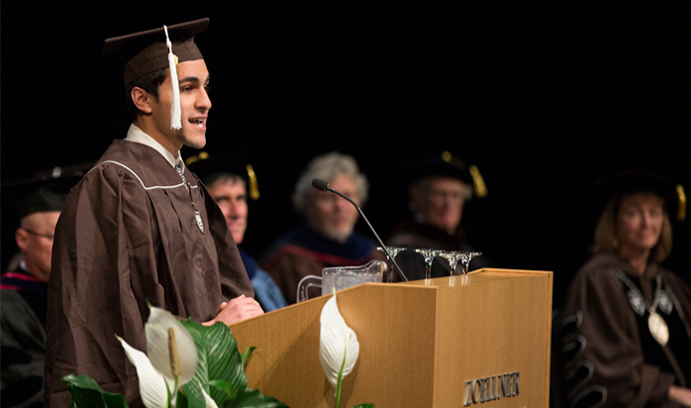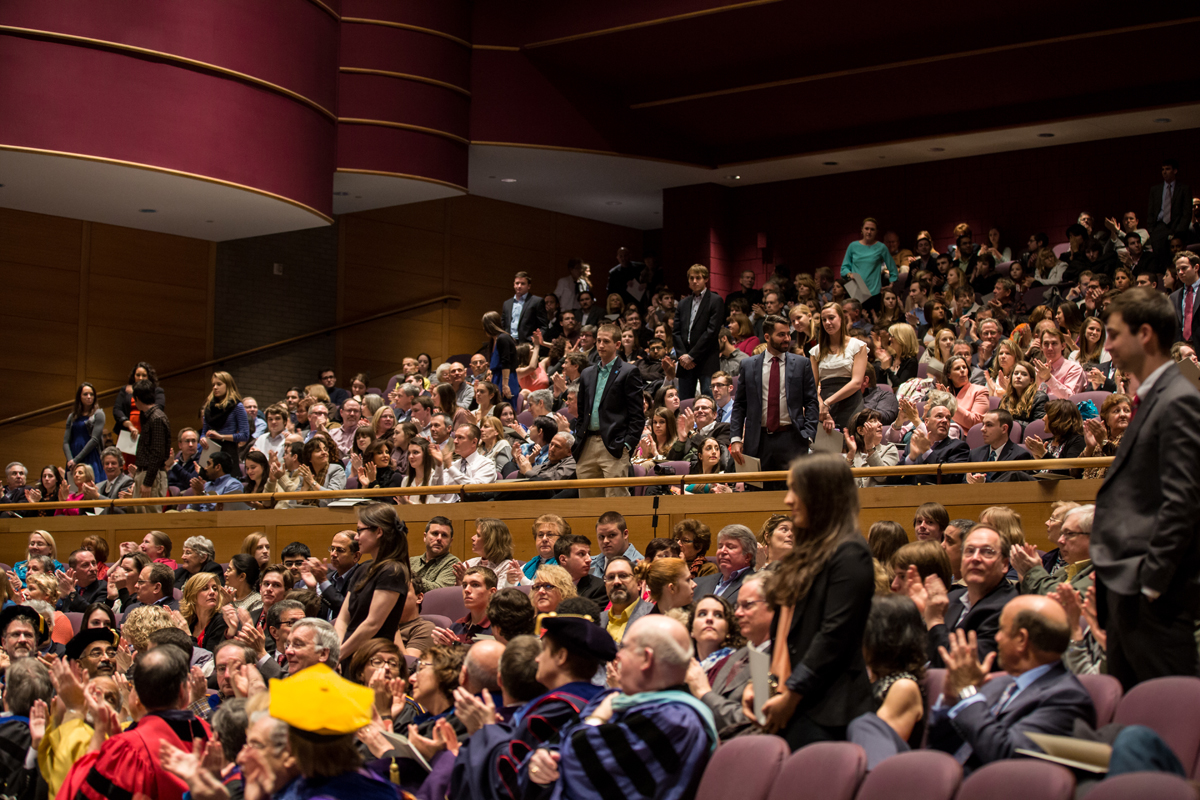Convocation honors scholarly achievement

More than 500 students were recognized for individual academic accomplishments at Lehigh University's 35th Annual Honors Convocation.
The university’s top administrators recently gathered in Baker Hall with more than 500 students and their families to honor academic achievement and to hear from one extraordinary young scholar from each of Lehigh’s three undergraduate colleges. The juniors and seniors at the 35th annual convocation had earned a cumulative grade point average of 3.6 or higher, and many also were selected for major academic awards or honor societies.
The audience was welcomed by Lehigh President Alice Gast, who spoke not of accolades and honors, but of the intangible achievements that take place as students transition into scholars.
“We pay tribute to your tenacity, your curiosity and your diligence,” said Gast. “We applaud your willingness to work hard, to think independently and to work collaboratively. We admire your dedication to excellence.
Stay curious. Be amazed. Maintain high standards. Practice kindness. Grow wise. I know you will do well.”
Provost Pat Farrell praised the students’ spirit of inquiry, a willingness to explore the unknown, and a desire to chart new pathways.
“This is the kind of student that Lehigh has produced for nearly 150 years: men and women eager to seek answers to the most fundamental and difficult questions on earth,” said Farrell, who cited climate change, health care and poverty as serious global challenges.
“We need creative thinkers and problem solvers, people who are prepared to see things differently, roll up their sleeves, and get after it. That’s what we’re all about at Lehigh, and those are the students we are recognizing today. These young women and men did not come here to blend in; they came here to stand out.”
Donald Hall, the Herbert J. and Ann L. Seigel Dean of the College of Arts and Sciences, thanked
“the professors who do so much to engage and inspire you, your parents whose love and encouragement makes today’s celebration possible, and your friends who cajole, push, and support you on your academic journey.”
The common thread running through their academic successes, he said, was an awareness that the greatest personal and academic growth occurs outside the classroom, setting the stage for lifetime of effecting change.
Hall introduced Aislinn Rowan, who completed her Bachelor of Science degree in biological sciences in January and is using her presidential scholarship this spring to finish a B.A. in psychology. A participant in Lehigh’s Eckardt Scholars Program, Rowan was selected for the Phage Hunters Advancing Genomics and Evolutionary Science research program, which is sponsored by the Howard Hughes Medical Institute’s Science Education Alliance. Rowan’s award-winning research involves the study of bacteriophages, the viruses that infect bacteria. She plans on continuing her research in graduate school.
“Make Lehigh – and all of us – proud”
Through her Lehigh experience, Rowan said she was surrounded by people who have achieved “fantastic success” studying an “absolutely amazing diversity of topics,” and that she is confident her fellow students will find success after graduation.
“Lehigh is a rigorous academic institution and it is not easy to achieve what you have achieved,” Rowan said. “To do so requires focus, dedication, self-regulation, and passion – all qualities that you will bring with you into the world beyond Lehigh and use to continue to achieve at the highest levels. No matter what all of you wish to do, no matter what you seek to achieve, no matter what your aspirations are, I have the utmost confidence that you will all find success, and make Lehigh – and all of us – proud.”
Tom Hyclak, interim dean of the College of Business and Economics, reminded his audience the fundamental purpose of life at a university is the pursuit of knowledge and truth.
As he looked out over the audience, Hyclak said, “I see the future. I see people who have been working hard to become the next generation of learned individuals. I see those who will lead our organizations, our communities and our nation and some who will replace us one day in the noble pursuits of the university and who will thereby put their imprint on the generations to follow.”
Hyclak introduced Briana Gardell, who, he said, “devoted herself to learning both the art and science of business.” A business information systems major and entrepreneurship minor with a 3.96 GPA and numerous scholarly prizes, Gardell has had several internships on and off campus, served as president of University Productions (where she supervises 20 students and manages a $200,000 budget) is a Martindale Scholar and studied the IT industry and telecoms privatization in Slovenia. Briana will use her Presidential Scholarship next year to work toward a master’s degree in technological entrepreneurship.
“When we run into stairs, we invent the escalator”
In her candid commentary, Gardell shared early setbacks in her Lehigh experience: scoring 20 points below average on her first college exam, being rejected by the Leadership Lehigh program, and receiving a poor grade on a paper she wrote for an introductory business course.
But citing the experiences of men like Walt Disney, who was fired from the Kansas City Star because his editor thought he lacked imagination, or Michael Jordan, who didn’t even make his own high school basketball team, Gardell said she came to realize that failure is only part of the journey to success.
“We need to remember,” she said, “that the only person that can define what we are capable of is ourselves. No one has a monopoly on good ideas. No one can define what is possible. No one can define what is right.”
A person’s dreams, she said, can serve as a constant motivator, despite setbacks. And, as the students strive to complete their ambitious goals, they need to remember not to confuse a singular defeat with a final defeat.
“When Lehigh students run in to problems,” Gardell said, “we find solutions. When we run into stairs, we invent the escalator.”
David Wu, dean of the P.C. Rossin College of Engineering and Applied Science, used his last speech at the Honors Convocation before he assumes a new role as provost at George Mason University to ponder the way learning takes place and the best way to facilitate that process.
From an engineer’s perspective, he said, “people learn when they are motivated to do something with that information.”
He recalled a news report about a 15-year-old high school student who looked through medical journals to find one biomarker that could be used to screen for pancreatic cancer.
The accumulation of knowledge, Wu said, “is not limited to medicine, science or engineering,” but is rather an “accumulation of insights that human society has gained over the past few centuries” and is motivated by a desire to answer a persistent question, solve a troubling problem or address a pressing issue.
Wu then introduced Russ Vignali, a student in the Integrated Business and Engineering (IBE) program with a major in civil and environmental engineering, a star track athlete and president of Lehigh’s chapter of B2P (Bridges to Prosperity), an organization that provides isolated communities with access to essential health care, education, and economic opportunities by building footbridges over impassable rivers.
“A singular appreciation for innovation”
Vignali, after graciously thanking Dean Wu for his decades of service to Lehigh, shared his recollection of his early interest in engineering, which was inspired by his first set of Legos. Free to use his imagination to build anything, he constructed elaborate skyscrapers, bridges and pyramids. From there, he graduated to forts fashioned from sofa cushions, and eventually to the Sim City computer game that allowed users the chance to create and manage their own city.
“I, of course, loved to design the various infrastructure systems,” he said. “But I was also intrigued by the business aspect of the game. You needed to manage taxes and create a budget and do a whole variety of things to make sure your city flourished. This is where I first gained an appreciation for the business aspect of engineering.”
Years later, when he was searching for a university, he learned about the IBE program and felt confident that he belonged at Lehigh. His story, he said, is probably not unique, but rather emblematic of the personal journey that led many of his fellow students to South Mountain.
“That’s the beauty of a school like Lehigh and the beauty of a group like this,” he said. “We all come from different corners of the globe, yet we are united in one common goal – the goal of utilizing our Lehigh education to make a difference in the world.”
Vignali said the Lehigh community has demonstrated a “singular appreciation for innovation,” and draws on a great sense of historical achievement through accomplished engineers such as McClintic, Marshall and Dravo.
“Their spirit lives in all of us,” he said, “and every time you open a textbook, be proud of the legacy you carry forward.”
He closed his comments with a personal recollection about his family in New York. As the grandson of Italian immigrants, Vignali said he was frequently reminded about the value of hard work and of honor. As early as ninth grade, Vignali and his brothers were regularly grilled by their father about their accomplishments.
“Every night, after we said grace at the dinner table, he would go, one by one, around the table saying, ‘Alex, did you bring glory to the family name today? No? Andrew, what about you?’ He would even ask my mom”
The nightly ritual inspired Vignali and his brothers to conclude each day with the thought of how hard work paid off.
Posted on:


